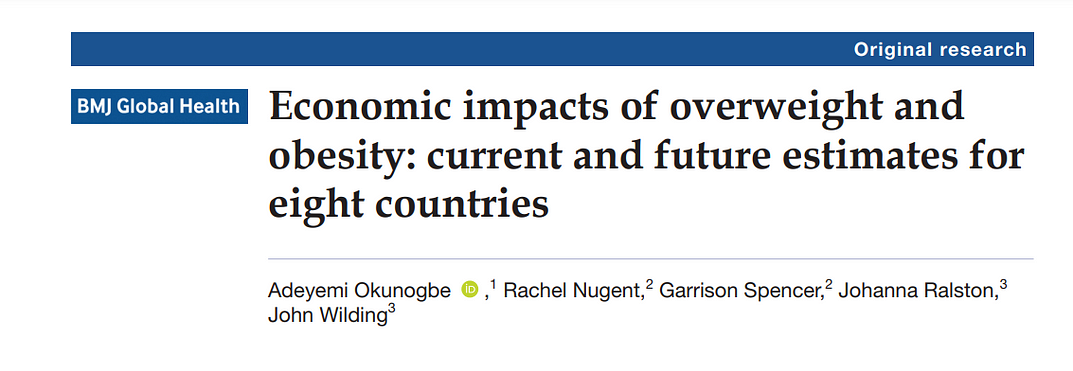By the World Obesity Federation
World Obesity and RTI International
March, 2022
Executive Summary
by Joaquim Cardoso MSc.
Chief editor of The Health Strategy Blog
March 3, 2022
This is an excerpt of the publication “The Economic Impact of Overweight & Obesity in 8 Countries”, focusing on the topic of the Recommendations, published by World Obesity Federation and RTI International.
Key facts
- Obesity-related NCDs account for over 4.7 million deaths globally each year, half of which occur amongst people under the age of 70
- A new pilot study — published in BMJ Global Health — has estimated the economic impact of obesity at between 0.8–2.4% of annual GDP in eight countries.
- In Brazil the estimated the economic impact of obesity is 2.11% of GDP (in 2019)
- The study also calculates the cost of continued political inaction, with economic impacts projected to rise up to 4.8% by 2060 if urgent action is not taken by public health leaders around the world.
- In Brazil the estimated the economic impact of obesity for 2060 is 4.54 % of GDP , what is more than double of 2019 estimates (2.11%)
Policy recommendations
The economic impacts are far too great to ignore.
Leaders at the national and international level must take immediate action to reduce the economic impact of overweight and obesity in their countries and communities.
Obesity has many root causes, all of which must be addressed for us to create a healthier future.
The obesity ‘ROOTS’ framework, launched by the World Obesity Federation in 2020, provides suggestions for obesity policy and advocacy that can be adapted to different national settings.
R (Recognise) — Recognise obesity as a disease and a risk factor, and promote understanding of its complexities
O (Obesity Surveillance) — Develop obesity surveillance and monitoring programmes and adopt evidence-based strategies for addressing obesity
O (Obesity Prevention) — Implement obesity prevention and management policies across the life course
T (Treatment) — Ensure treatment is equitably offered and accessible to all who want it
S (Systems Based Approaches) — Adopt systems-based approaches to address obesity

In recognition of the economic impact of obesity and in line with the ROOTs framework, we call on policymakers to:
R (Recognise)
Recognise obesity as a disease and a risk factor, and promote understanding of its complexities
Obesity is not only a risk factor for other diseases, it is also a complex, relapsing, multifactorial disease in its own right.
Further, obesity has several drivers including genetics, the environment, commercial factors, healthcare access and mental health, among others.
Recognising that obesity is a disease with multiple drivers is vital to help shift the public discourse away from an individual blame narrative.
A shift in the narrative should in turn encourage people to seek medical care, increase access to treatment for all that need it, foster investments in obesity research, and demonstrate the need to prioritise and improve the education of health professionals to prevent and manage obesity.
Recognising obesity as a disease and a risk factor can also help reduce weight bias and stigma, another driver of obesity that has repercussions on mental and physical wellbeing and prevents people from seeking necessary medical care.
Obesity is not only a risk factor for other diseases, it is also a complex, relapsing, multifactorial disease in its own right.
Further, obesity has several drivers including genetics, the environment, commercial factors, healthcare access and mental health, among others.
O (Obesity Surveillance)
Develop obesity surveillance and monitoring programmes and adopt evidence-based strategies for addressing obesity
All approaches to the prevention, management and treatment of obesity should be data-driven and evidence-based.
Obesity monitoring and surveillance allows us to keep track of obesity trends and fully understand its determinants, treatment options, economic impact, and policy consequences.
Research must be funded, supported and acted upon by governments, and must actively seek out the involvement of people with lived experience of obesity.
Work such as this — that interrogates the long-term impacts of obesity — helps push for commitment to evidence-based policy action by making the case clear to national decision-makers.
All approaches to the prevention, management and treatment of obesity should be data-driven and evidence-based.
O (Obesity Prevention)
Implement obesity prevention and management policies across the life course
Halting the rise in overweight and obesity requires policies that can help prevent obesity throughout the life course and create healthy environments.
Investing in childhood obesity prevention and treatment is vital to halt a course of poor health and social outcomes in adulthood, while addressing adult obesity can prevent the risk of obesity being passed down through generations.
Equally, addressing the commercial determinants of health and improving the environment we live in is essential for halting the rise in overweight and obesity, supporting the maintenance of a healthy weight, and helping people to retain health gains from interventions.
Investing in childhood obesity prevention and treatment is vital
Equally, addressing the commercial determinants of health and improving the environment we live
To help address the environmental drivers of obesity, we encourage policymakers around the world to reaffirm their previous commitments to childhood obesity and NCDs and prioritise population-based regulatory and fiscal measures to create health-promoting environments, by:
- Restricting the marketing of foods and drinks to children
- Taxing sugar-sweetened beverages
- Mandating front of pack labelling
- Limiting portion and package sizes
- Increasing access to safe spaces for physical activity
As well as addressing the drivers, policymakers must adopt rigorous principles of engagement to prevent commercial interests from undermining health goals.
To help address the environmental drivers of obesity, we encourage policymakers …(1) to reaffirm their previous commitments to childhood obesity and NCDs and (2) prioritise population-based regulatory and fiscal measures to create health-promoting environments, by:
* Restricting the marketing of foods and drinks to children
* Taxing sugar-sweetened beverages
* Mandating front of pack labelling
* Limiting portion and package sizes
* Increasing access to safe spaces for physical activity
T (Treatment)
Ensure treatment is equitably offered and accessible to all who want it
In recognition of the fact that obesity is a disease, we call for obesity treatment to be integrated into Universal Health Coverage as an “essential health service.”
This would ensure that children, adolescents and their families have equitable access to adequate prevention and treatment services.
In addition, health services should build multi-disciplinary teams to support people living with obesity and provide specialist and general training in weight management for healthcare professionals and medical students.
We urge political leaders to build strong health systems that are equipped to manage and treat obesity and related illnesses.
we call for obesity treatment to be integrated into Universal Health Coverage as an “essential health service.”
In addition, health services should build multi-disciplinary teams to support people living with obesity and provide specialist and general trainingin weight management for healthcare professionals and medical students.
We urge political leaders to build strong health systems that are equipped to manage and treat obesity and related illnesses.
S (Systems Based Approaches)
Adopt systems-based approaches to address obesity
Interventions to address obesity will require a ‘whole of government’ approach and actions from multiple sectors to create a healthier environment for all children and their families.
It is important to use a systems-based approach and engage the food, health, education and other key sectors, as well as involving communities, families and children, and civil society organisations.
Ministries of health, education, social development, finance, media/culture, food/agriculture, welfare and transport all have a responsibility in supporting the development of healthy, sustainable environments for everyone.
Interventions to address obesity will require a ‘whole of government’ approach and actions from multiple sectors
It is important to use a systems-based approach and engage the food, health, education and other key sectors, as well as involving communities, families and children, and civil society organisations.
Conclusion
Obesity is a growing issue with deep, societal roots that requires decisive action from everyone.
The magnitude of the economic impacts — present and future — associated with overweight and obesity are significant and widespread. The time for evidence-based action on our obesogrenic environment and the other roots of obesity has long passed.
COVID-19 has demonstrated that we are capable of worldwide, societal responses to health challenges when there is political will and resources are made available. As a major risk factor for severe COVID-19 disease, obesity has been in the spotlight. We argue that we must use this renewed energy for evidence-based, sustainable change.
Improved understanding of the long-term impact of overweight and obesity on individuals, communities and health systems must push us forward and onwards in our pursuit for a healthier world for us all.
Comprehensive, cross-sectoral policies that help prevent, manage and treat obesity will be vital to reducing its prevalence globally.
Adopting the ROOTS framework on obesity gives us the tools to get there.
Comprehensive, cross-sectoral policies that help prevent, manage and treat obesity will be vital to reducing its prevalence globally.
Adopting the ROOTS framework on obesity gives us the tools to get there.
Ministries of health, education, social development, finance, media/culture, food/agriculture, welfare and transport all have a responsibility in supporting the development of healthy, sustainable environments for everyone.
Endnotes
See the original publication
References
See the original publication
Click below for the full version of the publication
Originally published at https://www.worldobesity.org
World Obesity Federation, 2021. The Economic Impact of Overweight & Obesity In 8 Countries. Summary report. [online] Available at: https://data.worldobesity.org/publications/ [Accessed 3 November 2021].
ORIGINAL RESEARCH

Economic impacts of overweight and obesity: current and future estimates for eight countries
http://orcid.org/0000-0002-7486-5176
Adeyemi Okunogbe 1,
Rachel Nugent 2,
Garrison Spencer 2,
Johanna Ralston 3,
John Wilding 3
1 Global Health Division, RTI International, Washington, D.C, USA
2 Center for Global Noncommunicable Diseases, RTI International, Seattle, Washington, USA
3 World Obesity Federation, London, UK












